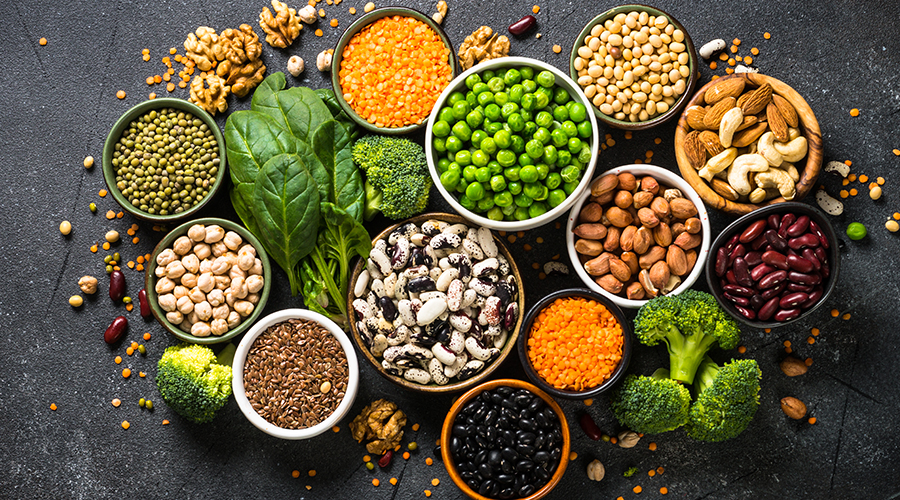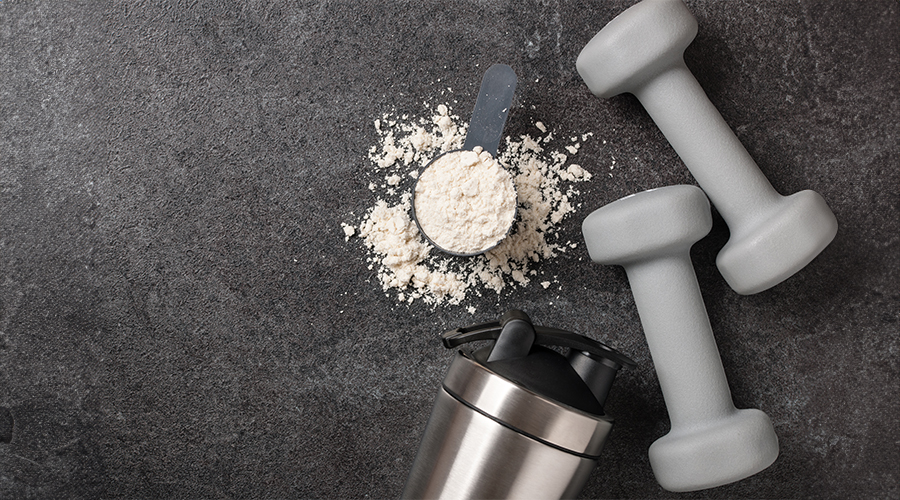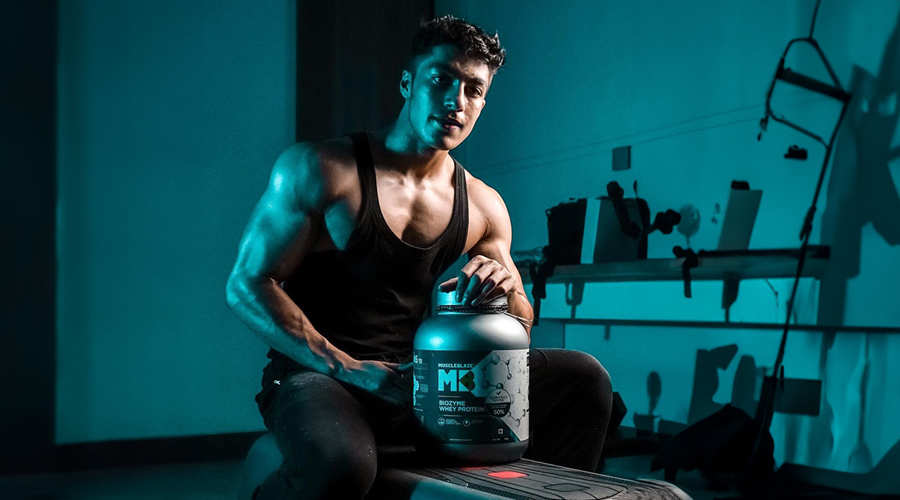Maximizing Muscle Gains: The Role of Protein in Your Diet
29 December 2023
Your body can benefit from muscular growth in ways beyond merely gaining power. Hitting your squat maximum can provide a rush, but the benefits of protein are far more profound than that sense of achievement. And the prerequisite to gaining muscle is a compound we are all aware of. Proteins have several functions and serve as the main structural elements of cells in the human body. Protein powder is good for health as it helps in building and repairing cells including the muscle cells injured during intense exercise that causes brief exhaustion and is the main job of the protein included in the food.
Dietary proteins are also involved in cell transport, hormone production, and the support of other physiological processes as enzymes. Mass gainers, which are the finest sources of protein provide an adequate blend of carbs and protein, helping to gain weight and, at the same time keeping your body fit.
Role Of Protein In Weight Loss and Muscle Gain
Most fitness enthusiasts are still determining the necessity of protein supplements or if eating enough is sufficient. It might be challenging for you to obtain the necessary proteins from diet alone if you’re a fitness novice looking to gain muscle. If you have a low appetite and a quick metabolism, the issue gets worse. With fewer lipids and carbohydrates than food, choosing a premium protein powder is good for health as it offers more protein per serving which is beneficial.
It is simpler to achieve your protein demands if you rely on a protein supplement. Muscle tissues are strained excessively during gym training, and eventually, they will break down. Since proteins make up muscles, you must supply a high-protein diet for muscle gain for the damaged muscle tissues to start the process of repairing themselves. A fast-digesting protein powder can supply essential amino acids that aid in the synthesis of new muscle within 45 minutes following exercise.

Whey protein also promotes muscle protein synthesis and expedites fat loss since it is absorbed more quickly. It’s important to realize, nevertheless, that proteins do not directly lead to fat burning. They grow more muscle. Muscle gainers aid in muscle growth and fat reduction when used in conjunction with appropriate weight exercise. Choosing protein in your health journey is not merely an option but a necessity.
How Much Protein Should You Take
The dietary amino acids aid in the body’s ongoing process of generating new cells to replace aging ones. The recommended daily allowance of protein for a healthy adult is 0.8–0.9g per kg of body weight (0.4–0.5g per pound).
- A person who engages in aerobic endurance training should consume 1.0 – 1.6g per kg of body weight (0.5–0.7g per pound) each day.
- Consuming 1.4–1.7 g/kg of body weight (0.6–0.8 g/pound) will enhance muscle protein synthesis in those who engage in a lot of strength exercise. For instance, a 170-pound male athlete who engages in moderate-to-intense activity most days of the week ought to eat between 70 and 170g of protein daily.
- Depending on their degree of activity, a person’s daily calorie intake should consist of 15–30% protein. On days when you engage in higher-intensity physical exercise, you should eat more protein.
- Instead of consuming protein one meal a day, it should be eaten throughout the day. For instance, it would be prudent for the previously stated 170-pound active guy to eat 20–40 grams of protein at a time, split between three meals and two snacks.
- Nearly half of the protein that the body stores is found in skeletal muscle, with the remainder protein found in tissues and organs including the kidneys and liver. Up to 15% of the protein is required for structural components like skin and bone.

Sources Of High-Quality Protein
Protein is necessary, as said above, and the major part of increasing the protein intake is trying it in various forms. Relying on red or processed meat limits your protein intake when you have abundant options.
Here are some of the sources you can rely on to delve into the richness of maximum protein:
- Dairy products: Dairy products such as skim milk, yogurt, and cheese offer abundant healthy protein. You should however be aware of low-fat yogurt or flavored milk. Processed cheese containing non-dairy ingredients should also be avoided.
- Poultry products: Poultry products are yet another source of high protein.
- Seeds and nuts: You can have your complete protein intake if you regularly consume nuts and seeds. Add them to salads or eat them as snacks, they are ideally effective.
- Soy products: Soy products are yet another alternative to red meat alternatives, very low in fat and rich in protein. Consume plant-based protein sources and tofu daily.
- Beans and peas: Another healthy option where you can get immense protein is beans and seeds. You can easily have them in your daily cooked meals as well as salads.
- Protein shakes and bars: You can always supplement your diet with protein skates and bars from Muscleblaze to complete your protein intake routine for the day.
- Protein supplements: Protein supplements are the ideal choice for gym goers, extensive trainers, and athletes as they provide the required amount of protein. You can add them to milk, or water or get your hands on already-made protein shakes.

Increase Protein Efficiency With Adequate Timing
Protein timing usually refers to the certain specified intervals when you take protein to maximize its benefits. Distributing the amount of protein you consume in a day rather than taking a whole lot at a single time improves muscle strength, boosts muscle recovery, and improves mass gain.
- Protein Before Exercise
Consuming protein before a workout helps the body obtain the necessary amino acids that are required to generate energy and muscle protein synthesis. Eating a protein bar or having a protein supplement in breakfast or snack 1-2 hours before a workout helps with the workout. You can also consume eggs, poultry, seafood, lean meat as well as beans or peas.
- Protein After Exercise
Consuming protein 1-2 hours after exercising maximizes the synthesis of muscle protein. It repairs torn tissues as well and stimulates muscular development.
- Bedtime protein
Slow digesting protein intake at night. It is advised by trainers it helps in muscle repair and a continuous interrupted supply of amino acids over night.
Frequently Asked Questions
Q1. What are the benefits of protein?
Protein has several benefits. It promotes mass gain, repairs muscles, increases amino acids in the body, recovers from fatigue, and boosts metabolism.
Q2. How much protein do you need after a workout?
Ans. Protein intake after a workout depends on several factors. However, 10 to 20 grams of protein after a workout is the ideal amount.
Q3. When should I take protein?
Ans. You can take protein daily in an adequate amount. You can also have pre-workout proteins, post-workout proteins, and throughout the day.








 100% Safe & Secure payments:
100% Safe & Secure payments:




